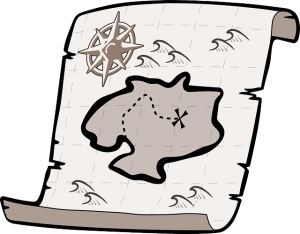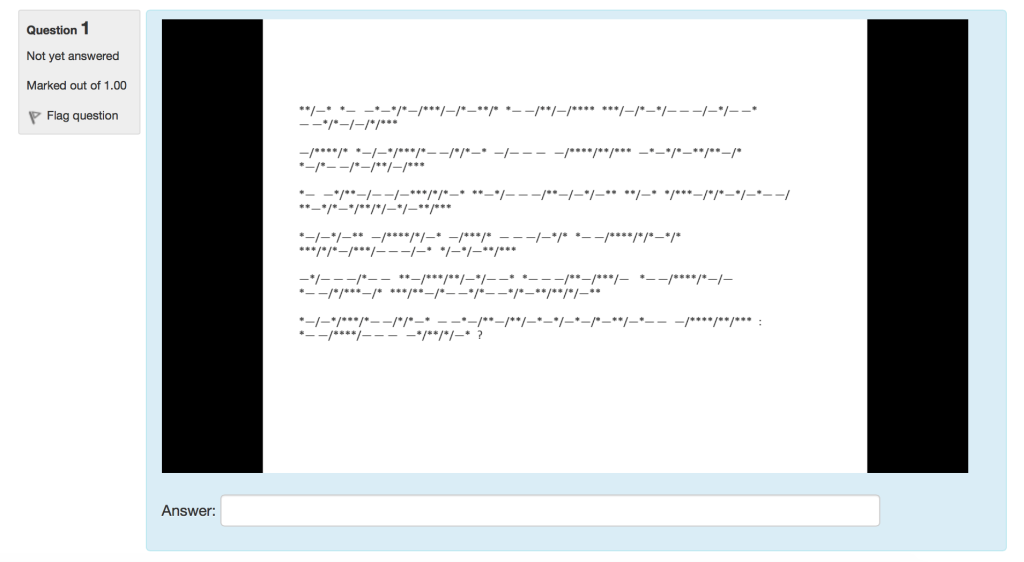Students create Moodle-based treasure hunt
 When most people think about using Moodle, the first word that comes to mind is probably not “fun.” But a group of Honors Fellows recently found a creative and, yes, even fun way to use the site—they employed Moodle to run the second semesterly National Treasure Scavenger Hunt for their fellow Honors students.
When most people think about using Moodle, the first word that comes to mind is probably not “fun.” But a group of Honors Fellows recently found a creative and, yes, even fun way to use the site—they employed Moodle to run the second semesterly National Treasure Scavenger Hunt for their fellow Honors students.
How it began
Jacquelyn Lanphear, a senior biochem/psych double major and the Honors Community Director, hosted the treasure hunt for the first time last spring. “I was really excited about the idea of a game that was National Treasure-esque,” Lanphear says, “and my hope was that the scavenger hunt/riddle series would be a fun way to get more fellows to engage in Honors activities.” She wanted to get students to feel a part of their Fellows community, in a way that required as much or as little time as each person could put in. “I also thought that people might like the challenge of noodling through riddles and racing to get to the end!” she says.
Last spring, Lanphear and a few other students developed the clues and delivered them to members of the Honors program via email. As students unraveled each riddle, they emailed in their responses to receive the next clue. Unfortunately, the email method proved to be slightly overwhelming for the treasure hunt’s facilitators. “It was really intense because we didn’t think that many people would play,” Lanphear says. Her email was perpetually flush with messages from students submitting answers and requesting hints.
Crafting clues in Moodle
This semester, Lanphear decided to let Moodle handle the grunt work of managing student submissions. Honors Program Director Tom Mould granted Lanphear administrator’s rights on the Honors Moodle page, and made three other students non-editing teachers. About a week before the treasure hunt went live, Lanphear met with Michael Vaughn in the Teaching and Learning Technologies office. They experimented with different formats, trying to determine which Moodle features would best suit the treasure hunt’s purpose. “It was really cool learning how to use Moodle and all the things Moodle can do,” Lanphear says.
Eventually, they decided to post the clues as a series of quizzes, wherein each subsequent quiz could only be accessed once a student had scored 100% on the previous one. Since all Honors Fellows had access to the Moodle page, and they would be able to guess any time of day, as many times as they wanted.
According to Lanphear, setting up the nest of quizzes so that each one could only be viewed under particular conditions was kind of like solving a puzzle. Things got especially complicated a few days into the hunt, when Lanphear and the other facilitators needed to slow down a few of the participants (since they hadn’t hashed out the last few clues yet). Using a bit of Moodle magic, Lanphear introduced a new rule—that no one would be able to get past Clue 5 until midway through the week. “It was nice that we still had a kind of control over clue delivery,” says Lanphear.
Drawbacks
According to Lanphear, there were a couple of drawbacks for setting up the treasure hunt on Moodle. For one thing, she saw a vast increase in the number of answer submissions on each clue. Now that students didn’t have to worry about bothering an actual person each time they submitted, Lanphear feared that some people might have resorted to quick guessing, rather than really working at the riddles. Lanphear also didn’t feel that she got to know the teams of players as well, now that their email conversation during the game was limited to the facilitators distributing hints.
Establishing a treasure hunt tradition
Lanphear says she would definitely recommend a Moodle-based treasure hunt to future Honors Community Directors. Now that she has already laid the foundation by setting up the series of quizzes, it should be easy for students to insert new clue questions for future scavenger hunts. Lanphear has even left this semester’s clues online, in case students want to play on their own time.
Breaking the Moodle mold
Moral of the story? Well, for one thing, treasure hunts are pretty cool, and so are the people who take the time to set them up for their fellow students. But also, Moodle doesn’t just have to be an administrative burden or a beast to be wrangled—put to creative use, Moodle can even be used for fun. If you have an idea for a Moodle-based project or activity but aren’t quite sure how to get started, contact Teaching and Learning Technologies.


 Follow
Follow

